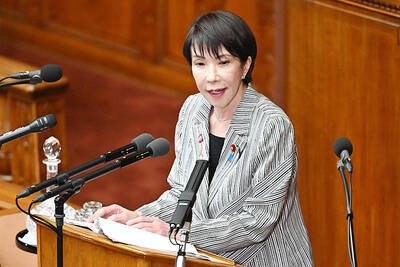InBev may be based in Belgium and have strong ties to Brazil, but the brewing giant has grand plans to sell Budweiser — what it calls America in a bottle — to the world.
But InBev and its ambitious Brazilian chief executive Carlos Brito face a huge challenge to convince the world that it wants the iconic US brew as they try to make their US$52 billion takeover of Budweiser-owner Anheuser-Busch pay off.
“Budweiser brings the great America in a bottle. That’s what consumers love,” Brito told journalists last week as he announced InBev’s planned takeover of Anheuser-Busch.
During the month-long takeover battle for Anheuser-Busch, Brito sought to win over the skeptical board at his US rival by promising to make Budweiser the merged company’s flagship international premium brew.
Using InBev’s extensive international distribution network, he said he envisaged Budweiser following in the steps of other well-known American consumer products that ventured beyond US shores.
“When I look at other American companies that have done this before — like McDonald’s, like Pepsi, like Coke, like Frito-Lays, so many companies that have expanded abroad — I’m very excited,” Brito said.
However, consumer analyst Mike Hughes at market research group Datamonitor said that bringing an iconic US product to the global market might not be as easy in the age of globalization with countless products vying for consumers’ attention.
“The thing to remember about a lot of brands like Coca-Cola is that they were introduced decades ago when there wasn’t the choice we have today,” Hughes said. “It’s a lot more difficult to replicate than 30 or 40 years ago.”
InBev, which has some 200 brands in its portfolio, has already tried to catapult brands such as Stella Artois, Beck’s and Brahma into the international premium beer market.
Although InBev has had limited success, analyst Kris Kippers at Belgian brokerage Petercam sees better prospects for transforming Budweiser into an international brand of choice for beer lovers.
He said Budweiser was already such a well-known brand globally that simply by making it available in stores and pubs through InBev’s distribution network would “make a big difference.”
“The question now is cannibalization between the brands that are pointed out as global brands will be somewhat different,” he said. “I don’t know if Beck’s and Budweiser can live next to each other on the same shelf. It depends on how consumers react.”
While also optimistic that InBev will be able to transform Budweiser into an international premium beer, JPMorgan analyst Mike Gibbs said it would take a lot of money to do it.
“Even with high awareness and distribution clout, building a real presence for Bud in many markets is going to require substantial marketing investment,” he said in a research note.

Taiwan’s exports soared to an all-time high of US$61.8 billion last month, surging 49.7 percent from a year earlier, as the global frenzy for artificial intelligence (AI) applications and new consumer electronics powered shipments of high-tech goods, the Ministry of Finance said yesterday. It was the first time exports had exceeded the US$60 billion mark, fueled by the global boom in AI development that has significantly boosted Taiwanese companies across the international supply chain, Department of Statistics Director-General Beatrice Tsai (蔡美娜) told a media briefing. “There is a consensus among major AI players that the upcycle is still in its early stage,”

‘SECRETS’: While saying China would not attack during his presidency, Donald Trump declined to say how Washington would respond if Beijing were to take military action US President Donald Trump said that China would not take military action against Taiwan while he is president, as the Chinese leaders “know the consequences.” Trump made the statement during an interview on CBS’ 60 Minutes program that aired on Sunday, a few days after his meeting with Chinese President Xi Jinping (習近平) in South Korea. “He [Xi] has openly said, and his people have openly said at meetings, ‘we would never do anything while President Trump is president,’ because they know the consequences,” Trump said in the interview. However, he repeatedly declined to say exactly how Washington would respond in

Japanese Prime Minister Sanae Takaichi said yesterday that China using armed force against Taiwan could constitute a "survival-threatening situation" for Japan, allowing the country to mobilize the Japanese armed forces under its security laws. Takaichi made the remarks during a parliamentary session yesterday while responding to a question about whether a "Taiwan contingency" involving a Chinese naval blockade would qualify as a "survival-threatening situation" for Japan, according to a report by Japan’s Asahi Shimbun. "If warships are used and other armed actions are involved, I believe this could constitute a survival- threatening

WARFARE: All sectors of society should recognize, unite, and collectively resist and condemn Beijing’s cross-border suppression, MAC Minister Chiu Chui-cheng said The number of Taiwanese detained because of legal affairs by Chinese authorities has tripled this year, as Beijing intensified its intimidation and division of Taiwanese by combining lawfare and cognitive warfare, the Mainland Affairs Council (MAC) said yesterday. MAC Minister Chiu Chui-cheng (邱垂正) made the statement in response to questions by Democratic Progressive Party (DPP) Legislator Puma Shen (沈柏洋) about the government’s response to counter Chinese public opinion warfare, lawfare and psychological warfare. Shen said he is also being investigated by China for promoting “Taiwanese independence.” He was referring to a report published on Tuesday last week by China’s state-run Xinhua news agency,